#especially if its people from other countries ESPECIALLY if its countries from south america
Text
the worst thing about big celebrities coming to my country is that then twitter is flooded with the worst most chronically online takes criticizing us for things that have never been an issue
#in YOUR country that woman can't even attend some wedding bc a bunch of people go to stalk her why are you so pressed about an APPLAUSE#i lasted like two seconds and no one even got close to her like its such a non issue#also its always from like this pretend moral high ground that they DONT HAVE#like its alwas like “omg they dont understand privacy over there” like im sorry AND YOUR COUNTRY DOES???????#they always try to sound like they're the ones who are right by being condescending to everyone else#especially if its people from other countries ESPECIALLY if its countries from south america#and when you tell them they're being xenophobic they try to spin the narrative in the stupidest ways to try and make themselves look good#long story short: i hate gringos yall are so insufferable#also us argentinians like to clap and cheer for everything
0 notes
Note
The thing that confuses me about the "don't vote" left (not the "I don't want to vote", I'm talking explicitly the "don't vote" left. I don't agree with the "I don't want to vote" left either but I can understand their logic) is they lose me at the final step of the logic. I've tried to connect the logic here, even if I don't agree with a political position I do try to understand where people are coming from (empathy for someones situation is not the same as cosigning it), but I just can't connect the dots here in a way that isn't deeply cruel.
Does United States politics prioritize the lives of those in the US (and often white) over those in the Global South? Yes, it's a fucking atrocity. We should continue to make noise about it, cus Biden has used less drones and that shows progress, even if it's not enough.
The part where I lose the plot is where the conclusion to this injustice is to let even more people die? Cus that's kinda how I see the idea of not voting: I can pick between shit and more shit, and at the end of the day, I'm picking whoever allows the most people to make it to the next day. Given Trumps stance on everything but specifically climate change, I feel like Biden is pretty significant harm reduction.
I don't think both things can't be true: that every life lost is a travesty we should not forget AND the more people we can save is worth fighting for.
The thing is, I have seen nothing among the "don't vote" far left (and I am talking here specifically about the people who both loudly announce their intention not to vote and try to convince others to do the same) to convince me that they actually care about harm reduction or stopping genocide. They only care about what makes them look the most Correct and/or superior to the Democrats. They yelled bloody murder about Obama using drones, they went dead quiet about Trump using them even more (even when he nearly started WWIII by assassinating the Iranian general Soleimani with one), and then said nothing at all when Biden reduced the drone program to almost nothing and withdrew the US from a failed war in Afghanistan it had long ago lost. Now they will yell all day about Israel/Hamas (something that Biden did not start and has had no direct military role in responding to) but they don't care about Russian genocide of Ukraine and Syria, Chinese threats to invade Taiwan, etc, because those governments are "anti-western/anti-American" and therefore should be defended. Their opposition to human suffering is extremely conditional and rests on whether they can look good out of it, and they never interrogate the hypocrisies of their own ideology.
Likewise: every country in the world prizes its own citizens above those of other countries. It's just a basic fact. Yes, the US has a grim history of intervening in other countries and causing untold civilian damage (especially during the Cold War and then in post-9/11 War on Terrorism). Yes, that legacy is complex and needs to be acknowledged. But literally none of that will be fixed, not to mention all the vulnerable people in America itself who will be punished, by Trump getting into power again. Biden is not just a grudging "lesser evil," but has done a lot of truly good and helpful things, regardless of the Online Leftists' constant lies, misinformation, and misrepresentation. If you spend all your time announcing what a champion you are for non-American marginalised people and/or those undergoing terrible suffering, and then deliberately and knowingly adhere to a course of action that will increase that suffering tenfold not only for those people but your own neighbors, friends, and family, then no, I don't believe you are a brave champion of social justice. You just want to know what categories of people you can gleefully and righteously punish and make to suffer for not believing the same things as you, that makes you just as dangerous as the right-wing fascists, and I can and will call out your ass accordingly.
237 notes
·
View notes
Text
pick a picture; something positive in your life rn!
Hello. There is always something in our lives that we can appreciate more, something that we may not notice but it can brighten our day! This reading aims to shine some light on that and hopefully raise your spirits!
Pick a picture; (1-4)

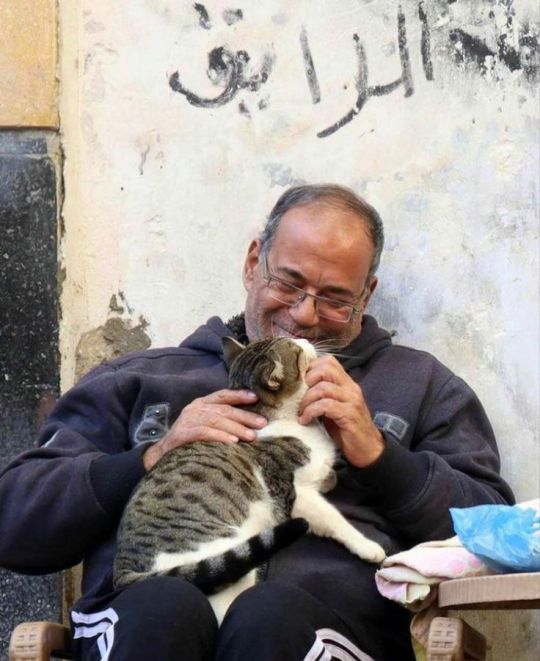
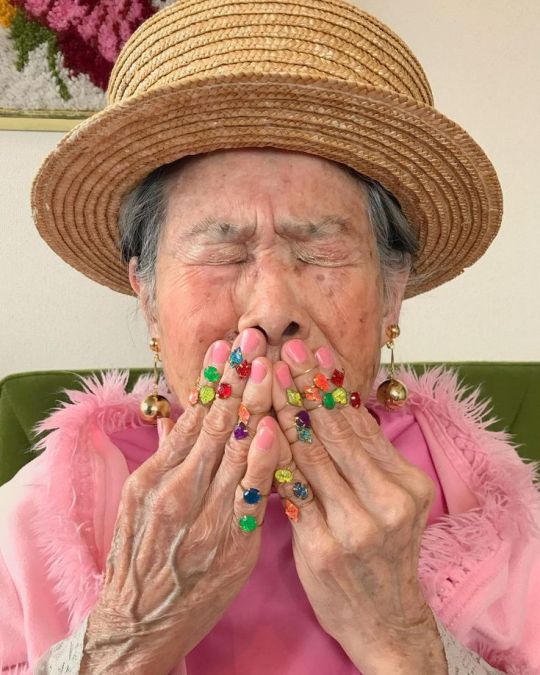

Pile 1;
Pile 1 you have your culture! I get that your culture is very community based and lively. You just have to go outside to feel the rythym of your nation. Scenes coming to mind are music on the street, public celebrations where the whole neighbourhood comes in to rejoice. If you're not in a place to have direct acces to your culture you can definitely seek it out online! Through videos and popculture content, your mood would definitely improve! The nostalgia and love for your nation shines through. Some of you definitely come from cultures of melanated people; Africa, South America, even the diasporas in america or western countries. You have recently been ruminating on past mistakes and actions. You probably already know by now that your inner thoughts and self talk have a huge impact of your daily reality, constant self deprecation can have adverse effects on your mental health. I',m getting that you really don't need me to tell you this and it's somehting that weighs you down on top of everything else. oouuf. For some in this pile, you are simply feeling nostalgic and thinking about the what could have beens because you've made a big move/change(could be physical relocation) or are about to and are feeling a sense of trepidation. Either way, it's good to forget about your problems for a while right now. Indulge in your culture and nostalgia, reminisce about all your childhood experiences growing up in your community, the quirky habits of your family members. Think about and lean into the times that you were happy in the past!
Pile 2;
Hi pile 2, you need to lean into your fun and crazy friends. People with whom you can be accepted fully. Your individuality! Playful expression of your authentic self especially when you feel like you have to stifle it to produce a more easily digestible persona for other people. They don't understand the genius behind what you do and call it weird, but so what!? Something positive in your life right now is that you have the chance to express yourself and have fun! Don't waste it, go be silly with your friends, make childish art. Be playful and dumb. Distilling every step of your creative process to make it more palatable to other people is robbing you of your joy and doing nothing for your art! You may be working with some people at work or school or whatever aspect it may be in your life. I'm seeing that its specifically on something intended for public viewing/presentatipn and while you may have initially been excited about it you feel suffocated by the other peoples influence now. Release this frustration by allowing yourself to have your own creative release and nurturing time alone. Make sure you are giving to yourself, and producing work that YOU are satisfied with, no matter anyone else's opinion on the matter!
Pile 3;
Hello lovely pile threes. You have the fruit of your hard work to appreciate in your life right now! You're breaking out of old habits and starting to look on the bright side of things! For some of you, you've recently gotten out of a relationship that was draining you for a while and you're feeling a HEAVYYY sense of relief. For others, its an issue of self worth that you're finally feeling like you're letting go of. Baggage has been released! Life has been good for you lately, you've been going out, having fun, talking with friends long into the night, laughing more. Definitely, you've seen an improvement in your friendships. There's lighter energy. You've stopped taking things so seriously. I feel like this pile has been feeling such a sense of appreciation for seemingly mundane things that you used to gloss over. Your cup of tea in the morning, the food you eat, the trees outisde your house. Everything is beautiful for you right now and carries hope. You're playful and looking to enjoy life, no strings attached!
Pile 4;
Hello Pile 4, you seem so weary. You may have been drawn to pile 3, so check it out if you feel exceptionally drawn to do so! Pile 4, you defer from pile 3 in that you have not yet broken out into the hopeful, joyous state of release. What you have to look forward to is hope. Hope that things will get better for you. It seems at every turn, its just gotten worse. Things only work out for other people and for you its perpetual suffering right? WRONG! Thats not true. You're in a depressive state right now and you may be leaning into self pity heavily from time to time because that feels like the only way you can get release. However, you keep working towards a better future and IT'S COMING! Keep holding on! This pile reminds me of the song Please,Please,Please, Let Me Get What I Want by the Smiths. Give it a listen I feel like the people in this pile may resonate with it. There are some difficult things you need to do to get out of this limbo and experience real change. You've been putting them off for so long, but you need to go through with them. There's a concept in psychology known as impact bias.(look into it!)Its basically where we overstimate our reaction to future events. In this case its a perceived negative event in the future. Trust me when you do it you'll feel more glad than sad, you'll find that when you're living through the moment you'll feel much less worse than you expect yourself to do. And don't forget the after, there's a reason you have to go through whatever it is that you're procrastinating and it'll result in a happier you.
*****
That is all :) I loved doing this reading I feel like it lifted my spirits too! If it resonated, don't hesistate to tell me. Feel free to leave any feedback here under this post or in a reblog. If you liked the post please like it and reblog! :) Hope you have a wonderful day and see you in the next reading!
#overandundertarot#pac#tarot#divination#pick a card#intuitive reading#pick a pile#pick a picture#tarot pick a card#pick a card reading#pick a pile reading#pac reading#pick an image
224 notes
·
View notes
Text
Denazification, truth and reconciliation, and the story of Germany's story
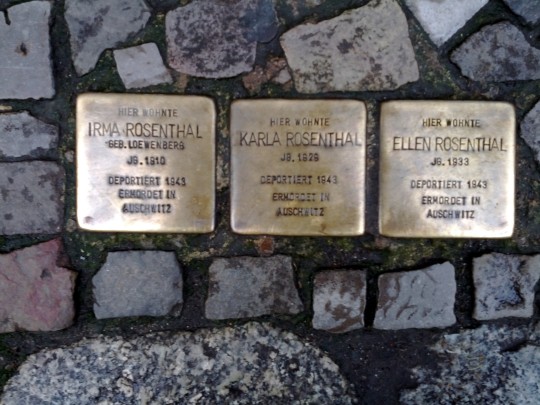
Germany is the “world champion in remembrance,” celebrated for its post-Holocaust policies of ensuring that every German never forgot what had been done in their names, and in holding themselves and future generations accountable for the Nazis’ crimes.
All my life, the Germans have been a counterexample to other nations, where the order of the day was to officially forget the sins that stained the land. “Least said, soonest mended,” was the Canadian and American approach to the genocide of First Nations people and the theft of their land. It was, famously, how America, especially the American south, dealt with the legacy of slavery and Jim Crow.
Silence begets forgetting, which begets revisionism. The founding crimes of our nations receded into the mists of time and acquired a gauzy, romantic veneer. Plantations — slave labor camps where work was obtained through torture, maiming and murder — were recast as the tragiromantic settings of Gone With the Wind. The deliberate extinction of indigenous peoples was revised as the “taming of the New World.” The American Civil War was retold as “The Lost Cause,” fought over states’ rights, not over the right of the ultra-wealthy to terrorize kidnapped Africans and their descendants into working to death.
This wasn’t how they did it in Germany. Nazi symbols and historical revisionism were banned (even the Berlin production of “The Producers” had to be performed without swastikas). The criminals were tried and executed. Every student learned what had been done. Cash reparations were paid — to Jews, and to the people whom the Nazis had conquered and brutalized. Having given in to ghastly barbarism on an terrifyingly industrial scale, the Germans had remade themselves with characteristic efficiency, rooting out the fascist rot and ensuring that it never took hold again.
But Germany’s storied reformation was always oversold. As neo-Nazi movements sprang up and organized political parties — like the far-right Alternative für Deutschland — fielded fascist candidates, they also took to the streets in violent mobs. Worse, top German security officials turned out to be allied with AfD:
https://www.wsws.org/en/articles/2018/08/04/germ-a04.html
Neofascists in Germany had fat bankrolls, thanks to generous, secret donations from some of the country’s wealthiest billionaires:
https://www.spiegel.de/international/germany/billionaire-backing-may-have-helped-launch-afd-a-1241029.html
And they broadened their reach by marrying their existing conspiratorial beliefs with Qanon, which made their numbers surge:
https://www.thedailybeast.com/how-fringe-groups-are-using-qanon-to-amplify-their-wild-messages
Today, the far right is surging around Europe, with the rot spreading from Hungary and Poland to Italy and France. In an interview with Jacobin’s David Broder, Tommaso Speccher a researcher based in Berlin, explores the failure of Germany’s storied memory:
https://jacobin.com/2023/07/germany-nazism-holocaust-federal-republic-memory-culture/
Speccher is at pains to remind us that Germany’s truth and reconciliation proceeded in fits and starts, and involved compromises that were seldom discussed, even though they left some of the Reich’s most vicious criminals untouched by any accountability for their crimes, and denied some victims any justice — or even an apology.
You may know that many queer people who were sent to Nazi concentration camps were immediately re-imprisoned after the camps were liberated. Both Nazi Germany and post-Nazi Germany made homosexuality a crime:
https://time.com/5953047/lgbtq-holocaust-stories/
But while there’s been some recent historical grappling with this jaw-dropping injustice, there’s been far less attention given to the plight of the communists, labor organizers, social democrats and other leftists whom the Nazis imprisoned and murdered. These political prisoners (and their survivors) struggled mightily to get the reparations they were due.
Not only was the process punitively complex, but it was administered by bureaucrats who had served in the Reich — the people who had sent them to the camps were in charge of deciding whether they were due compensation.
This is part of a wider pattern. The business-leaders who abetted the Reich through their firms — Siemens, BMW, Hugo Boss, IG Farben, Volkswagon — were largely spared any punishment for their role in the the Holocaust. Many got to keep the riches they acquired through their part on an act of genocide.
Meanwhile, historians grappling with the war through the “Historikerstreit” drew invidious comparisons between communism and fascism, equating the two ideologies and tacitly excusing the torture and killing of political prisoners (this tale is still told today — in America! My kid’s AP history course made this exact point last year).
The refusal to consider that extreme wealth, inequality, and the lust for profits — not blood — provided the Nazis with the budget, materiel and backing they needed to seize control in Germany is of a piece with the decision not to hold Germany’s Nazi-enabling plutocrats to account.
The impunity for business leaders who collaborated with the Nazis on exploiting slave labor is hard to believe. Take IG Farben, a company still doing a merry business today. Farben ran a rubber factory on Auschwitz slave labor, but its executives were frustrated by the delays occasioned by the daily 4.5m forced march from the death-camp to its factory:
https://pluralistic.net/2023/06/02/plunderers/#farben
So Farben built Monowitz, its own, private-sector concentration camp. IG Farben purchased 25,000 slaves from the Reich, among them as many children as possible (the Reich charged less for child slaves).
Even by the standards of Nazi death camps, Monowitz was a charnel house. Monowitz’s inmates were worked to death in just three months. The conditions were so brutal that the SS guards sent official complaints to Berlin. Among their complaints: Farben refused to fund extra hospital beds for the slaves who were beaten so badly they required immediate medical attention.
Farben broke the historical orthodoxy about slavery: until Monowitz, historians widely believed that enslavers would — at the very least — seek to maintain the health of their slaves, simply as a matter of economic efficiency. But the Reich’s rock-bottom rates for fresh slaves liberated Farben from the need to preserve their slaves’ ability to work. Instead, the slaves of Monowitz became disposable, and the bloodless logic of profit maximization dictated that more work could be attained at lower prices by working them to death over twelve short weeks.
Few of us know about Monowitz today, but in the last years of the war, it shocked the world. Joseph Borkin — a US antitrust lawyer who was sent to Germany after the war as part of the legal team overseeing the denazification program — wrote a seminal history of IG Farben, “The Crime and Punishment of I.G. Farben”:
https://www.scribd.com/document/517797736/The-Crime-and-Punishment-of-I-G-Farben
Borkin’s book was a bestseller, which enraged America’s business lobby. The book made the connection between Farben’s commercial strategies and the rise of the Reich (Farben helped manipulate global commodity prices in the runup to the war, which let the Reich fund its war preparations). He argued that big business constituted a danger to democracy and human rights, because its leaders would always sideline both in service to profits.
US companies like Standard Oil and Dow Chemicals poured resources into discrediting the book and smearing Borkin, forcing him into retirement and obscurity in 1945, the same year his publisher withdrew his book from stores.
When we speak of Germany’s denazification effort, it’s as a German program, but of course that’s not right. Denazification was initiated, designed and overseen by the war’s winners — in West Germany, that was the USA.
Those US prosecutors and bureaucrats wanted justice, but not too much of it. For them, denazification had to be balanced against anticommunism, and the imperatives of American business. Nazi war criminals must go on trial — but not if they were rocket scientists, especially not if the USSR might make use of them:
https://en.wikipedia.org/wiki/Wernher_von_Braun
Recall that in the USA, the bizarre epithet “premature antifascist” was used to condemn Americans who opposed Nazism (and fascism elsewhere in Europe) too soon, because these antifascists opposed the authoritarian politics of big business in America, too:
https://www.thenation.com/article/archive/premature-antifascist-and-proudly-so/
When 24 Farben executives were tried at Nuremberg for the slaughter at Monowitz, then argued that they had no choice but to pursue slave labor — it was their duty to their shareholders. The judges agreed: 19 of those executives walked.
Anticommunism hamstrung denazification. There was no question that German elites and its largest businesses were complicit in Nazi crimes — not mere suppliers, but active collaborators. Antifacism wasn’t formally integrated into the denazification framework until the 1980s with “constitutional patriotism,” which took until the 1990s to take firm root.
The requirement for a denazification program that didn’t condemn capitalism meant that there would always be holes in Germany’s truth and reconciliation process. The newly formed Federal Republic set aside Article 10 of the Nuremberg Charter, which would hold all members of the Nazi Party and SS responsible for their crimes. But Article 10 didn’t survive contact with the Federal Republic: immediately upon taking office, Konrad Adenauer suspended Article 10, sparing 10 million war criminals.
While those spared included many rank-and-file order-followers, it also included many of the Reich’s most notorious criminals. The Nazi judge who sent Erika von Brockdorff to her death for her leftist politics was given a judge’s pension after the war, and lived out his days in a luxurious mansion.
Not every Nazi was pensioned off — many continued to serve in the post-war West German government. Even as Willy Brandt was demonstrating historic remorse for Germany’s crimes, his foreign ministry was riddled with ex-Nazi bureaucrats who’d served in Hitler’s foreign ministry. We still remember Brandt’s brilliant 1973 UN speech on the Holocaust:
https://www.willy-brandt-biography.com/historical-sources/videos/speech-uno-new-york-1973/
But recollections of Brandt’s speech are seldom accompanied by historian Götz Aly’s observation that Brandt couldn’t have given that speech in Germany without serious blowback from the country’s still numerous and emboldened antisemites (Brandt donated his Nobel prize money to restore Venice’s Scuola Grande Tedesca synagogue, but ensured that this was kept secret until after his death).
All this to say that Germany’s reputation as “world champions of memory” is based on acts undertaken decades after the war. Some of Germany’s best-known Holocaust memorials are very recent, like the Wannsee Conference House (1992), the Memorial to the Murdered Jews of Europe (2005), and the Topography of Terror Museum in (2010).
Germany’s remembering includes an explicit act of forgetting — forgetting the role Germany’s business leaders and elites played in Hitler’s rise to power and the Nazi crimes that followed. For Speccher, the rise of neofacist movements in Germany can’t be separated from this selective memory, weighed down by anticommunist fervor.
And in East Germany, there was a different kind of incomplete rememberance. While the DDR’s historians and teachings emphasized the role of business in the rise of fascism, they excluded all the elements of Nazism rooted in bigotry: antisemitism, homophobia, sectarianism, and racism. For East German historians, Nazism wasn’t about these, it was solely “the ultimate end point of the history of capitalism.”
Neither is sufficient to prevent authoritarianism and repression, obviously. But the DDR is dust, and the anticommunism-tainted version of denazification is triumphant. Today, Europe’s wealthiest families and largest businesses are funneling vast sums into far-right “populist” parties that trade in antisemitic “Great Replacement” tropes and Holocaust denial:
https://corporateeurope.org/sites/default/files/2019-05/Europe%E2%80%99s%20two-faced%20authoritarian%20right%20FINAL_1.pdf
And Germany’s coddled aristocratic families and their wealthy benefactors — whose Nazi ties were quietly forgiven after the war — conspire to overthrow the government and install a far-right autocracy:
https://www.reuters.com/world/europe/25-suspected-members-german-far-right-group-arrested-raids-prosecutors-office-2022-12-07/
In recent years, I’ve spent a lot of time thinking about denazification. For all the flaws in Germany’s remembrance, it stands apart as one of the brightest lights in national reckonings with unforgivable crimes. Compare this with, say, Spain, where the remains of fascist dictator Francisco Franco were housed in a hero’s monument, amidst his victims’ bones, until 2019:
https://en.wikipedia.org/wiki/Pedro_S%C3%A1nchez#Domestic_policy
What do you do with the losers of a just war? “Least said soonest mended” was never a plausible answer, and has been a historical failure — as the fields of fluttering Confederate flags across the American south can attest (to say nothing of the failure of American de-ba’athification in Iraq):
https://en.wikipedia.org/wiki/De-Ba%27athification
But on the other hand, people who lose the war aren’t going to dig a hole, climb in and pull the dirt down on top of themselves. Just because I think Germany’s denazification was hobbled by the decision to lets its architects and perpetrators walk free, I don’t know that I would have supported prison for all ten million people captured by Article 10.
And it’s not clear that an explicit antifascism from the start would have patched the holes in German denazification. As Speccher points out, Italy’s postwar constitution was explicitly antifascist, the nation “steeped in institutional anti-fascism.” Postwar Italian governments included prominent resistance fighters who’d fought Mussolini and his brownshirts.
But in the 1990s, “the end of the First Republic” saw constitutional reforms that removed antifascism — reforms that preceded the rise of the corrupt authoritarian Silvio Berlusconi — and there’s a line from him to the neofascists in today’s ruling Italian coalition.
Is there any hope for creating a durable, democratic, anti-authoritarian state out of a world run by the descendants of plunderers and killers? Can any revolution — political, military or technological — hope to reckon with (let alone make peace with!) the people who have brought us to this terrifying juncture?
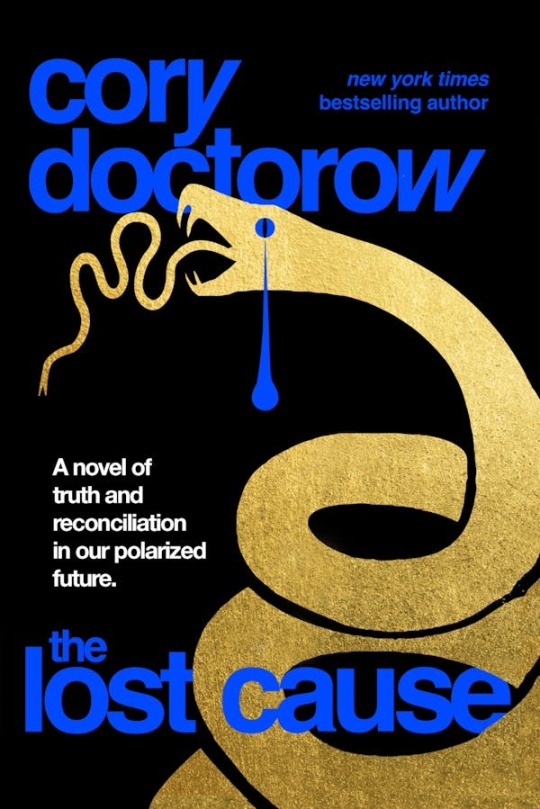
[Image ID: The Tor Books cover for ‘The Lost Cause,’ designed by Will Staehle, featuring the head of the snake on the Gadsen ‘Don’t Tread on Me’ flag, shedding a tear.]
Like I say, this is something I’ve spent a lot of time thinking about — not just how we might get out of this current mess, but how we’ll stay out of it. As is my wont, I’ve worked out my anxieties on the page. My next novel, The Lost Cause, comes out from Tor Books and Head of Zeus in November:
https://us.macmillan.com/books/9781250865939/the-lost-cause
Lost Cause is a post-GND utopian novel about a near-future world where the climate emergency is finally being treated with the seriousness and urgency it warrants. It’s a world wracked by fire, flood, scorching heat, mass extinctions and rolling refugee crises — but it’s also a world where we’re doing something about all this. It’s not an optimistic book, but it is a hopeful one. As Kim Stanley Robison says:
This book looks like our future and feels like our present — it’s an unforgettable vision of what could be. Even a partly good future will require wicked political battles and steadfast solidarity among those fighting for a better world, and here I lived it along with Brooks, Ana Lucía, Phuong, and their comrades in the struggle. Along with the rush of adrenaline I felt a solid surge of hope. May it go like this.
The Lost Cause is a hopeful book, but it’s also a worried one. The book is set during a counter-reformation, where an unholy alliance of seagoing anarcho-capitalist wreckers and white nationalist militias are trying to seize power, snatching defeat from the jaws of the fragile climate victory. It’s a book about the need for truth and reconciliation — and its limits.
As Bill McKibben says:
The first great YIMBY novel, this chronicle of mutual aid is politically perceptive, scientifically sound, and extraordinarily hopeful even amidst the smoke. Forget the Silicon Valley bros — these are the California techsters we need rebuilding our world, one solar panel and prefab insulated wall at a time.
We’re currently in the midst of a decidedly unjust war — the war to continue roasting the planet, a war waged in the name of continuing enrichment of the world’s already-obscenely-rich oligarchs. That war requires increasingly authoritarian measures, increasing violence and repression.
I believe we can win this war and secure a habitable planet for all of us — hell, I believe we can build a world of comfort and abundance out of its ashes, far better than this one:
https://tinyletter.com/metafoundry/letters/metafoundry-75-resilience-abundance-decentralization
But even if that world comes to being, there will be millions of people who hate it, a counter-revolution in waiting. These are our friends, our relatives, our neighbors. Figuring out how to make peace with them — and how to hold their most culpable, most powerful leaders to account — is a project that’s as important, and gigantic, and uncertain, as a just transition is.

Next weekend, I’ll be at San Diego Comic-Con:
Thu, Jul 20 16h: Signing, Tor Books booth #2802 (free advance copies of The Lost Cause— Nov 2023 — to the first 50 people!)
Fri, Jul 21 1030h: Wish They All Could be CA MCs, room 24ABC (panel)
Fri, Jul 21 12h: Signing, AA09
Sat, Jul 22 15h: The Worlds We Return To, room 23ABC (panel)

If you'd like an essay-formatted version of this thread to read or share, here's a link to it on pluralistic.net, my surveillance-free, ad-free, tracker-free blog:
https://pluralistic.net/2023/07/19/stolpersteine/#truth-and-reconciliation

[Image ID: Three 'stumbling stones' ('stolpersteine') set into the sidewalk in the Mitte, in Berlin; they memorialize Jews who lived nearby until they were deported to Auschwitz and murdered.]
#pluralistic#stolpersteine#historians' dispute#Historikerstreit#nazis#godwin's law#mussolini#berlusconi#italy#antifa#fascism#history#truth and reconciliation#the lost cause#denazification
246 notes
·
View notes
Text
America headcanons (pt. 1):
America's super strength was a gift from his mother before she left. Her one last desperate attempt to protect her youngest child.
America needs to eat A LOT in order to maintain his strength. This wasn't the case when he was younger, but either the spell was only self sustaining until he reached adulthood or ... something else, America doesn't know. Doesn't really want to know. (When he doesn't eat enough, he gets incredibly hypoglycaemic.)
He had vegetarian phase after watching a documentary on the meat industry. Unfortunately, aforementioned strength and its dietary requirements meant he wasn't able to maintain it. Secretly, he was relieved he had a good reason to start eating meat again.
Has a genius IQ, and is endlessly curious. Sometimes he'll disappear for a while because he's getting a degree in whatever thing has interested him. If asked, he'll say his true loves are mechanical and aerospace engineering, as unlike some of the more theoretical sciences, he gets a tangible end result.
Currently works as a physicist at NASA.
Really out of touch with himself, especially in regards to his own sexuality. None of this is because of puritans, like most people would think - he has just run himself ragged so much since he gained independence that he's never once sat and thought about a lot things that isn't the next project or hanging out with his friends.
If he did ever think about it, Alfred would label himself as demisexual. Also, he would figure out he was gay as opposed to bi - something he currently believes because that tends to be the norm for their kind.
His circle of close friends include Japan, South Korea, Taiwan, Philippines (female), and India (female). It's a friendship built from a mix of loving food, science, tech and buying knick knacks, and they love going to each others' countries and trying both fancy restaurants and cheap eats, or showing off ridiculous op shop purchases they've made or the latest games they've discovered/books they've read. It's genuinely a really wholesome group. (Note: I think I veered away from the canon of America not having any friends besides Mattie and England because I genuinely think America is fun? He has interests that are really solid bases for conversations and hang outs and while he's loud he also doesn't get mad or offended easily. He has a positive energy and is the right kind of weird to find other weird friends.)
America tends to be emotionally closed off even with his close friends, and only feels comfortable being vulnerable with Tony. He considers Tony his closest friend, and secretly fears Tony will one day leave Earth and go somewhere else.
Alfred can build a car, but can't drive one. He once tried to borrow Arthur's car to learn - it didn't work out, since Arthur was too furious with him for lugging it around to even hear him out.
Alfred is actually amazing at cooking, but barely any of the Europeans - or China - acknowledge it on the basis of him "butchering" their foods, aka changing even the most minor thing. Younger countries like Australia and New Zealand who aren't as ... strict about authenticity, tend to really enjoy his cooking. (And England, who falls a little bit more in love when America bakes him a steak pie.)
He has diagnosed seasonal affective disorder, which plays into him always gaining weight during winter. He has special blankets he only uses for when he's feeling sad, and his homes are filled with heat lamps.
#hetalia#aph#hetalia world series#axis powers hetalia#hws america#aph america#alfred f jones#alfred f. jones#✎#m: hetalia#hetalia: headcanon (char)#c: america#✎ hetalia bulletpoint headcanons#alfred is my fave but i had a hard time w this bc i have a LOT to say and a lot of thoughts#hopefully other parts will be mkre cohesive#i also have a headache?
28 notes
·
View notes
Text
Are we all secretly Argentinian? A brief history of VPN in Beemoov's fandom
Once upon a time, when only High School Life and maybe Eldarya TO were out, players were able to choose their own bank when making a purchase on the games websites. Some banks were extremely cheap compared to others, the cheapest of all being Argentina. This from the perspective of people living in other countries. As an example:
2800 Gold coins were worth 39€ or 49$ or 400 ARS
400 ARS were the equivalent of 27$ in 2016.
So, clearly, anyone given the chance would spend less with such a big discount. And the chance was indeed given, since it was easy to just select another country's bank on the website.
Fast-forward a few years, the option to choose a bank was removed, and people could only use the bank associated to the country they were connecting from. It didn’t take much time for people to realise that it was enough to change IP via a VPN to make the games think you were connecting from Argentina and still access its bank. Additionally, Argentinian's currency was getting more and more devaluated in time and prices were never really adjusted at the bank. So, those 2800 Gold which were worth 400ARS or 27$ in 2016, were now worth 11$ in 2019.
This VPN trick has been around for years now. Not all players were aware of course, and not everyone was comfortable in using a VPN or able to. But still, quite a lot of people were doing so. Some of them even made a business out of it, recharging other people's accounts using a VPN and taking a fee for their "service".
Fast-forward again, to 2022. The VPN trick escalated, the secret was not that much of a secret anymore, especially because people were freely talking about it everywhere, Discord, Facebook, all social media really, even TikTok videos were made explaining how to do it. Very simply, too many people were using it. Consequently, Beemoov worked on it and managed to remove Argentina's bank from most VPNs for people playing from Europe and North America. (NOT South America, as I vaguely remember it was mentioned that they were trying to protect the Argentinians living in nearby countries). This led to a crazy uproar, mostly from the biggest fandom affected, the French one. People were leaving tons of messages on all socials demanding the reinstatement of Argentina, and also sending curses and death threats to Beemoov employees. The most recurrent message was of people outraged that the company had blocked VPNs without telling their players and demanding dialogue and compromise. On the other hand, Beemoov replied that VPNs were never a functionality of the games, and they don't need to discuss it with players.
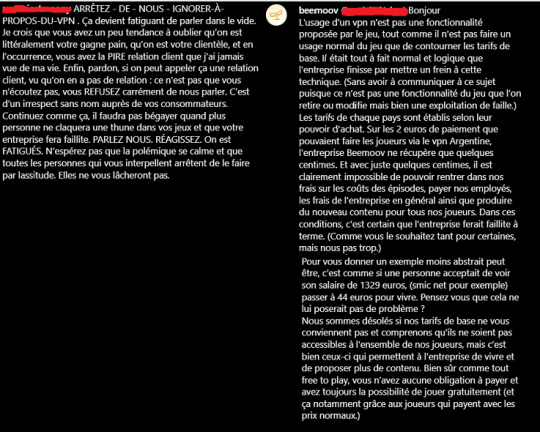
Approximate translation of Beemoov's official reply (neither French nor English are my mother tongues so feel free to double check):
"Goodmorning. The use of VPN isn't a functionality offered by the game, just like it isn't normal use of the game to circumvent the base tariffs. Thus it's normal and logic that the company would put a stop at this technique. (Without having to communicate it since it's not a functionality of the game that we are retiring or modifying, but the exploitation of a fallacy.) The tariffs that each country pays are established according to their buying power. Of the 2 euros payment that can be done by the players via VPN Argentina, the company only earns a few cents. And with just a few cents it's clearly impossible to cover the costs of the episodes production and business costs in general, pay our employees, and create new content for our players. Under these conditions, it's certain that the company would eventually go bankrupt. (Like many of you wish, but us not that much.) To give you a less abstract example, it's as if someone would accept to see their salary of 1329 euros (minimum wage, for example) drop to 44 euros. Do you think this person would be able to live without any problem? We are sorry if our base tariffs are not convenient for you and we understand that they are not accessible to all of our players, but these are what allow the company to survive and to make new content. Of course like in all free-to-play games you are not obliged to pay and you always have the possibility of playing for free (and this is thanks to the players who pay the normal price)."
Fast forward again to this year, August 2023. The economic crisis in Argentina has led to high inflation and 22% devaluation of currency. All businesses have had to up their prices, including Beemoov. Those 2800 gold coins that used to be worth 400 ARS ~ 27$ in 2016, and then 11$ in 2019? Are now worth 1.14$. Beemoov has had to up the prices and now these are costed at 6,800 ARS (or 19.43$), an increment of 17 times its original value (but still less than the 2016 dollar equivalent).
Consequently, we have seen now the rest of the fandom, the part that hadn't been affected one year ago, going ballistic. And the same kind of threats and complaints that were posted last year by the European fandom are now posted by the American fandom. One would assume that only the Argentinians are complaining, rightfully so, since they are the ones directly affected. But actually most of the complaints come from people living elsewhere who were either using VPNs for their own benefit or created a business out of it.


(these are from 4 different people I found with just a 5 minutes search, we really live in a capitalist dream lmao)
Additionally, people have been upset about the company's reply. This message has been circulating in several social media, and people wonder if it's true or fake.
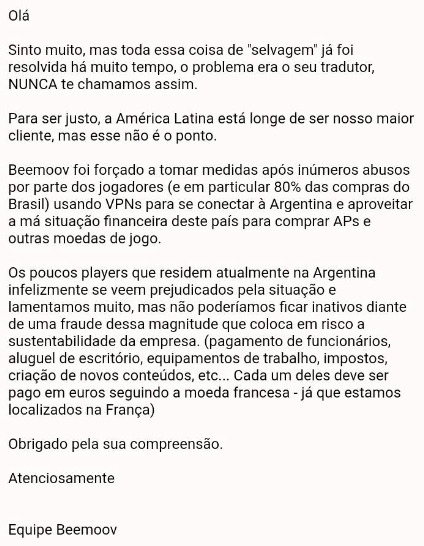
I don't know who originally posted so I can't say if it's true or not. (Personally I tend to believe it is.)
(Using Google translate here because I don't know a word of Portuguese, so please correct me if this is wrong.)
"To be fair, Latin America is far from our biggest customer, but that's not the point. Beemoov was forced to take action after numerous abuses by players (and in particular 80% of purchases from Brazil) using VPNs to connect to Argentina and take advantage of this country's poor financial situation to buy APs and other in-game currencies. The few players currently residing in Argentina are unfortunately affected by the situation and we are very sorry, but we could not remain inactive in the face of a fraud of this magnitude that puts the company's sustainability at risk (payment of employees, office rent, work equipment, taxes, creation of new content, etc... Each of these must be paid in euros following the French currency - as we are located in France)."
People have been particularly offended by that "LATAM isn't our biggest customer" which isn't hate, it's a fact. Despite the LATAM fandom being big (second only to France by number of players), the currencies of all the countries involved are worth less than euros, and that's why it can't be the biggest client, it's just math.
Some math below for who is interested, but feel free to skip:
For example 1300 gold are costed 200 in mexican pesos which is 10.7 euros. Similarly this same amount of gold is 30BRL in Brazil, which translates to 1.6 euros. Compared, 1300 gold in France are costed 19 euros. (On top of these there are also bank fees and currency exchange fees). This means that, if no one were using VPN, it would take two mexican players for Beemoov to earn the same amount as they earn from a French player. And even more, 12 Brazillian players to pay what they get from one single French player. (Again, I'm not considering bank fees, so these numbers should actually be higher). Of course this is just an example on one single purchase. It's not representative of the whole bank. But with some very hacky math, approximately I think that LATAM doesn't contribute to more than a quarter of Beemoov's revenue (and keep in mind that for the past year LATAM could use Argentina VPN and Europe couldn't). Of course, again, this is veeeery approximate, but I remember Brazil wasn't included in Uncoven, so I think that if they are cutting another bank in the future it might be that one. This is not the case for New Gen of course since we know Brazillian is one of the languages included.
So, where are we now?
VPNs are still being used of course, not Argentina but other countries (mostly Brazil, Turkey, and a few others). I don't think there's any stopping VPNs for good in the old games, but I'm pretty confident the company might've found a way for New Gen.
What do I think of all this?
These up here are facts. Now my personal opinion is that things aren't that black and white. I totally agree with the fact that the company has expenses and needs to pay salaries of their employees etc etc. At the same time it's also true that for whatever business when a product is faulty prices are lowered. Eldarya ANE has not the same quality as the other games, prices should reflect that but they don't. Similarly, some episodes are released very bugged, and people have to replay 3, 4, 5 times to get the illustration they would've been able to get in one playthrough and should be compensated for that. In Moonlight Lovers there was a crazy bug for more than a year, me and the friends I made guides with had to replay each episode at least 5-8 times. I don't even want to try to estimate the amount of money I wasted on that game otherwise I would curl in a ball and cry. The company should've provided compensation to us and all the players who played Moonlight Lovers during that year, but they didn't. So when episodes are bugged and people have to replay many times I see VPNs as morally justified.
But bugs asides, the point is that if VPNs were used only a few times, and only by those players who really would not be able to play otherwise, then nothing would've happened. But as always, when something is abused the "authorities" try to put a stop to it. (Because really it's crazy that a middle-class European via VPN spends only a few cents on each episode and then expects to see more content. This isn't only fraud against the company, but also disrespectful toward the players who pay full price and allow the games to keep existing.)
However, I want to end this post with a positive message, if anyone made it this far it's earned. During my deep dive in the fandom to write this post, I saw that the trolls, the haters, the death and violence threats against Beemoov workers or other players, the wishes to see the company go bankrupt and everyone left without a job, all these came from Europeans and Americans alike. Seeing all these curses and threats in english, french, spanish, brazillian portuguese etc warmed my heart. There is no racism when it comes to hate, humanity sucks everywhere 💕
81 notes
·
View notes
Text
Difference between "Romani"/"Roma" and "Romanian"
I decided to make this post because a lot of people get Romanians and Roma mixed up. It's something that's pretty common, even among Europeans who are more familiar with Roma than Americans are.
"Romanian" comes from latin "romanus", meaning "Roman", inhabitant of the city of Rome (Italy). Romanians are a white people indigenous to (Eastern) Europe living in Romania.
"Roma" (noun) and "Romani" (adjective) mean "people" in Romani language. It probably comes from Sanskrit "ḍoma", which refers to a traveling caste of musicians. Roma are a South Asian diaspora that traveled through the MENA region for about two centuries before arriving in Europe in the Middle Ages.
Many people get Romanian and Romani confused because of the following reasons:
the names are similar: this is true but coincidental, as "Romanian" comes from Latin and "Romani" comes from Sanskrit, and both words have very different meanings
Romania has the largest Romani community in Europe: this is true. The reason is that, upon entering Europe in the Middle Ages, the Roma that arrived in Romania were enslaved and couldn't move out of the country. The slavery of Roma in Romania lasted 500 years. After it ended, in the mid. 19th century, the majority of those Roma remained in Romania, though a few of them migrated to America and to Western Europe.
TL;DR
The Romanians are indigenous to Europe. The Roma are indigenous to India.
Romanians are usually Orthodox Christians. Roma can be of any religion, typically converting to the dominant religion of the region we settled in.
Romanian culture (singular) is a unique culture that was influenced by its proximity to Slavic, Greek, Hungarian, German cultures. Romani cultures (plural) are of South Asian origin and were shaped over the centuries by our travelling through the Middle East and Europe.
Romanians live in Romania. Roma don't have a particular country.
The reason many Roma live in Romania is because Romania has a long history of anti-Romani racism and slavery.
Romanians often suffer from xenophobia when living abroad because they are (white) Eastern Europeans. Roma suffer from racism and xenophobia: we are a brown people whose cultures are very identifiable as non-European. As such, we have suffered and still suffer segregation, police brutality, ghettoization, slavery, pogroms, slaughters, discrimination in the workplace and in education. Anti-Romani racism is still the most widespread form of racism in all European countries to this day.
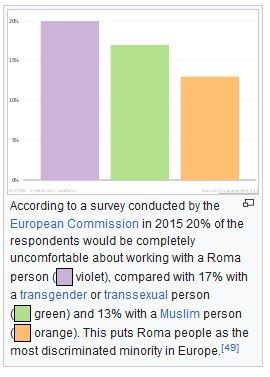
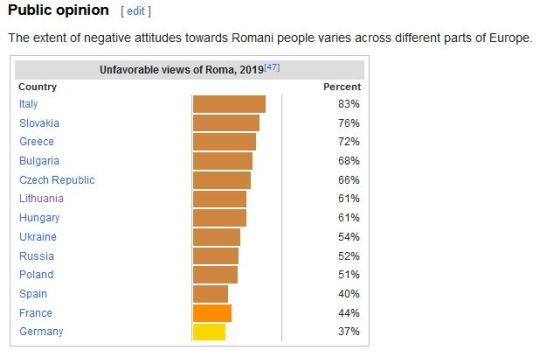
The majority of Roma, especially those living in Eastern Europe, ie around 2/3rds of Roma, are visibly brown, because of our mixed ancestry (South Asian + MENA), though some groups can be lighter due to interracial marriages with white people. It's the case of the British Roma, in particular.
Our traditions, culture and belief system evolved with us from India through the Middle East to Europe. It is thus pretty recognizable as "non-European" and has been used to identify us as "others/foreigners" over the centuries. FYI, there is not one single and unique Romani culture, because cultural beliefs and practices, as well as religion and Romani language dialect can vary a lot between each Romani group. To make it more intelligible, I invite you to think of the larger Romani diaspora as one race that is composed of a manifold of Romani ethnic groups.
Romanian

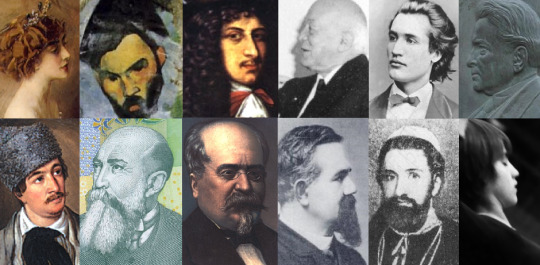





Romani (adjective) / Roma (noun)
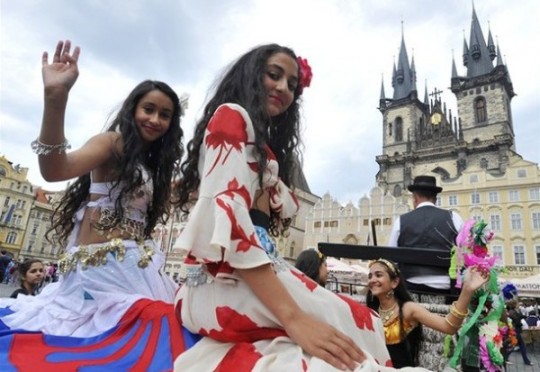
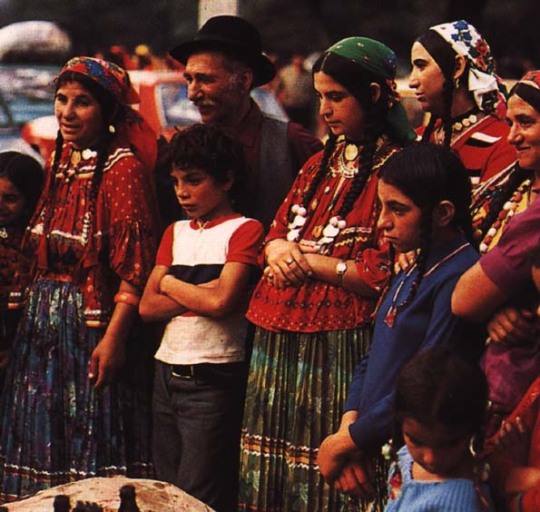
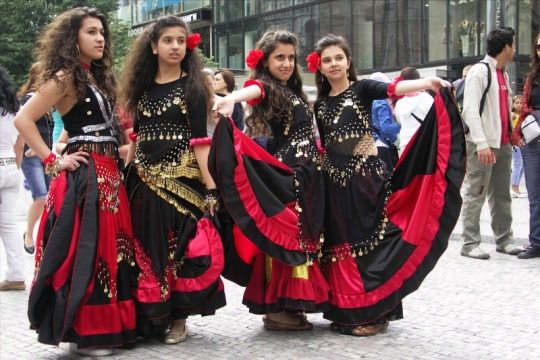



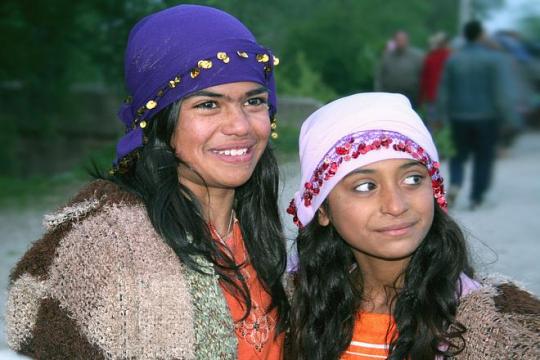
(I have more of these in my "Roma" tag)
Roma =/= Romanian. Romanians are European while Roma are a South Asian diaspora. While Romanians do suffer xenophobia when living in Western Europe and America, anti-Romani sentiment is a type of racism widespread in all of Europe and America. It's particularly important to know the difference between Roma and Romanian, as Romania has a very long history of racism against Roma: slavery, segregation, ghettos, genocide.
#roma#don't hesitate to ask questions if something isn't clear or if you wanna know anything in particular!!
194 notes
·
View notes
Text
marigolds

It's October! For half the hemisphere, the nights are getting longer, the wind is getting colder and the weather is taking on a distinct grey and overcast mood. What better time than now to steal a few last bursts of brilliant, warm sunshine and keep them close against the coming of winter?
Enter October's flower (one of them) - the marigold.
An interesting thing I found while researching this month's flower was that its native to the Americas - and yet some sites list the ancient Greeks and Romans having traditions surrounding the marigold. One of the sites even mentions the flower being introduced to the 'Americas' several sentences after telling me its native to Mexico. I think some of the confusion may come from the fact that there are marigolds of the Tagetes genus, which are the ones I think of when I think of marigolds, that were first mentioned by the Aztecs and are native to the Americas - and there is a flower, Calendula officinalis, called the 'pot marigold' which comes from the same daisy family but is a different genus and seems to originate in southern Europe. To add to the confusion, the Spanish imported the Tagetes marigold from the Americas and from Spain it spread to, particularly, monastery gardens across Europe where it was cultivated into various strains with names like the African or French marigold. The American marigold didn't even have an official genus name until 1753. So, sorting through marigold myths was a lot like playing 'guess which twin it is' for me especially since the majority of the sites I was wandering through either weren't aware of a difference or didn't differentiate. I found one site that marked the difference between them (shout out to growingvale.com). I can understand why. We're only talking flower folklore here, not nuclear codes. My little nitpicky soul though just wasn't happy until it figured out what was going on. I am now going to spew facts at you and try to tell you which flower is which for each of them.
We'll see how I do.
Let's start at the beginning.
Tagetes marigolds were first recorded as being cultivated by the Aztecs, who considered them both medicinal and sacred. That tradition has carried over into Mexico's el Día de los Muertos, the Day of the Dead, which is celebrated either in late October or Early November depending on the region. How much of that is straight from the Aztecs and how much is later European influence via Catholicism is still up for debate but the marigold plays a special part in both. The brightness and strong scent of the marigold flowers are believed to help guide the spirits of the dead to their family and to the offerings left out for them. You watched Disney's Coco (or Fox's The Book of Life), you get it. The Day of the Dead is celebrated outside of Mexico as well, with traditions varying from place to place but right now, we're talking marigolds.
In a half step to the side of that, the Victorians also considered marigolds a funeral flower but in a solemn and grief-filled way that made their cheery color inappropriate for any other kind of bouquet.
In South Asia, the Tagetes marigold has in large part replaced Calendula officinalis marigold while still serving the same purpose. There marigolds are used to create garlands and decorations for weddings, festivals and sacred holidays. Both Buddhism and Hinduism attach spiritual significance to the flowers. In India, giving a garland of marigolds to someone is considered a sign of friendship.
Walking it back to our Calendula officinalis marigold, the common name of 'marigold' is actually a break down of 'Mary's gold'. The golden colored plant was often left on alters and shrines to the Virgin Mary in Catholic countries in the middle ages by people that couldn't afford to leave actual coins. Its bright sunshine color and availability to everyone soon became associated with her.
This is the marigold that the ancient Romans and Greeks used medicinally and that medieval Europe thought was a cure against the plague. This is also the marigold that was woven into garlands for doors and livestock in Ireland to keep away fairy attention.
Both branches of flowers are popular with love superstitions, representing never having to lose a love and as a good luck charm when it comes to love.
And let's round things off with a gardening fact. Marigold are considered excellent companion plants for most vegetable gardens because they repel pests from the big to the very tiny kind. Just check before you plant. Their roots also give off an antibacterial chemical that will wreck havoc on your legumes.
Happy birthday, October babies!

#marigold#marigolds#folklore#superstition#cottagecore#herbalism#herbology#october#birth flower#day of the dead#dia de los muertos#dia de muertos#right up there with#dandelions#as a sunshine flower#flowers#language of flowers#meaning of flowers
58 notes
·
View notes
Text
Look at the war
(can also maybe apply to the main timeline if you want)
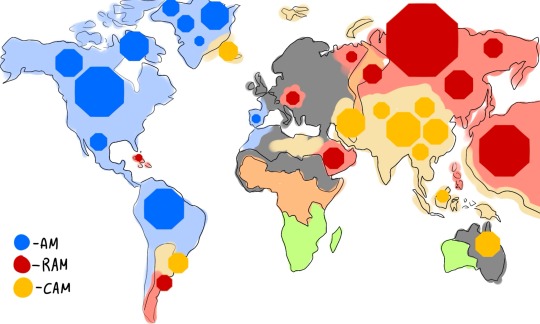
(Very rough/sketch of the idea, mainly showing the places of the AM megastructures and honey-combs)—Takes place the height of the war—
During the war many countries fell/surrendered and got absorbed into the larger powers. Listing the different areas/territories by colour (all super brief here):
Blue — USA (new name not decided, give a suggestion if you want), was very quick to take over Canada and a large portion of South America. The AM megastructures tend to be the largest and most complex on their main land, even where the structure isn’t directly, large pipes and cables all throughout the country are visible. Due to this, a rapid industrialisation has happened and there are very few rural areas left. America’s population (like most of the other places) is also experiencing a decline. The air is extremely polluted and when close to the megastructures it’s said that the smell of burning and rotting flesh is very potent. The remaining population either remains constantly inside, moving around through tunnels, or permanently underground in the new lower cities. Notably radical religious organisations have become more frequent due to the war, mostly due to people supposedly disappearing in their sleep without a trace.
Red— Russia has the largest Megastructure, however due to this, it faces the most attacks. One structure notably, was built small in the ocean yet over time it grew and built itself and the area around it up, creating a false floating continent. However it is due to its creation that a large population of sea life has been erratic and floods that wiped out many coastal cities and communities. Much like America very few rural areas remain, and due to extreme climate change caused by the war, the area faces even harsher and year long winters that have spread to the rest of Europe.
Yellow— China. The AMs (CAM) are very close together here and have been designed in such a way that people are able to live within them. Due to their general closeness to each other they tend to function better in self-protection than the other AMs. It is constantly building, more and more structures as opposed to constantly developing a single one. Within China a few rural and farming communities have been preserved, however due to such a fact, those areas in particular have become targets—especially to RAM.
Orange— These are actively hostile territories (well everywhere is hostile), but life is still found. Camps are usually found scattered, yet still alined to one of the powers. Mostly these are unclaimed territories that are being fighted for.
Grey— Dead zones. Areas so destroyed and ruined by the war that they near uninhabitable and been stripped dry of resources. This is where most of the fighting has happened, in what used to be Central Europe. Majority of the people who were there are dead or have been displaced (mostly in Russia and China, with the luckier ones making it to the Common Wealth of Southern Africa) The remaining people are scattered and can be found within underground shelters. These shelters are horrific places, with few supplies, little food, and constant sickness. The people are actively hunted by all the AMs. Notably Naomi is from one of these bunkers, having been forced into one at the age of two. Nimdok too (when he was alive alreast).
Green— The commonwealth of Southern Africa (previously the African Commonwealth) A bit after the war began (post 1994) many African nations merged diplomatically in order to better conserve resources better and to be a better neutral force. However as the war progressed more and more of the continent was over taken. However in the process the remaining state has become a power in of its own. Creating a defences that work efficiently to keep the AMs out. It was chosen to sanction themselves from the world and the war. Truly wanting no part in it. Eventually Australia did join, before half was taken, but the remainder acts as a port and outlook. This is one of the few areas were “regular” human society is still found, with there being heavy laws and propaganda meant to block out information of the war. Previously they had been very open to refugees, however they would begin to refuse them as it had opened opportunities to the AMs. Ellen and Evan are both from here. Gorrister also hides within it, however he smuggles himself in and out constantly, as being a member of the peace core, he has work to do all over the remaining world.
Where everyone is from including the survivors of the og and love au:
—Gorrister from England however he fled to America, then to COSA, and eventually to Russia where he would help develop the BE virus.
-Ted, Tiffany, and Gloria are all from the USA, however Ted is an average citizen, Tiffany is a member of one of the religious groups, and Gloria is a high ranking military commander, government official and one of the reasons of AM’s existence.
-(idk where Benny is from, can’t decide lol, same with Becky)
-Nimdok and Naomi are from different parts of Europe but both find themselves in the survival bunkers
-Ellen and Evan (being siblings) are from COSA, being born where Zimbabwe used to be. Evan however would go onto explore the rest of the state, mainly in the area where South Africa had once been. Ellen would stay closer to home. (Reason as to why is that in the original and audio drama, Ellen frequently refers to life before AM, and rarely mentions the war, which could mean she either doesn’t think about it or knows very little of it)
(There’s like no world lore in the og and whilst that is kinda the point, I just wanted to build on it a little. Will be posting some concept art for this stuff soon. As usual if you have ideas or suggestions please share)
#i have no mouth and i must scream#ihnmaims#am ihnmaims#ted ihnmaims#ihnmaimsloveau#alternate reality#ellen ihnmaims#harlan ellison#gorrister ihnmaims#ihnmaims am#ihnmaims ted#ihnmaims game
39 notes
·
View notes
Note
There’s something that has troubled me for awhile…there are a lot of calls online to take Aliyah, and I get it, I really do. I can understand the draw especially with more observant, visibly Jewish people because the targeting has become horrific. The fear is growing, and we are all looking back at history and getting generational Deja vu in a really traumatic fashion. And while I feel zero pressure to move to Israel atm…
But for Jews in the diaspora, I always wonder if there are any that are proud of where they are from, that identify with it as much as they identify being Jewish. We all have been raised to have Israel and Jerusalem in our heart and our soul. But I am as American as I am Jewish. Between both sides of my family, my blood has been in America for close to 150 years (my father’s side is 120, my mother’s side is closer to 150). If you put a picture of any natural landscape in Israel or the skyline of Jerusalem or Tel Aviv with a skyline of my home city and the Adirondacks or the Appalachian mountains, my emotional pull will be towards the latter set of pictures.
I can’t see myself ever moving to Israel. I feel that if my ancestors wanted to go back to our collective roots, they would and they’d brave the tyranny of the Ottomans and the British Occupation along with the genocidal hostility of the Arab nations. But they came to America, so I am American born and bred, as are my parents and my grandparents and my maternal great grandparents.
And I wonder, are there any other Jews that feel this way about their country? Any fellow Americans, any British, Canadian, and Australian Jews? Are there Jews in Europe and South America that feel the same? Where they will always support Israel and its right to exist, but they can never imagine living there and can only see themselves living in the country they are currently from?
I will always support Israel’s right to exist. But I am American as much as I am Jewish, so I will support from across the Atlantic.
anon, I want you to know your feelings are valid, you shouldn't be pressured to make an Aliyah for any reason, just because Israel is a Jewish country doesn't mean all Jews must live there or want to live there.
in Israel, it's a pretty common question to ask people for their ancestry (for like ice breakers), and a lot of people will be able to tell you exactly where their grandparents are from, even if they have a very mixed ancestry. for us, where we came from is not something to be erased, it's a major a part of who we are. we're not just Israeli we're polish, iraqi, yemenite, moroccan, russian, italian, ethiopian, hollandi (dutch?), sabra, etc.
I can't talk for Jews in the diaspora, I believe there would be many people who share your feelings, but I can tell you most Israelis would probably understand your pride in your ancestry.
- 🐬
18 notes
·
View notes
Text
Mile & Apo: It takes two to triumph

IN THE GLITZY REALM OF entertainment, where talent often shines like a beacon, there occasionally emerges a pair of stars whose chemistry transcends the screen. Such is the case with Mile and Apo, two charismatic Thai actors whose TV show KinnPorsche has become a global sensation, watched by millions of viewers from Russia and India, to Poland and Peru.
The two have risen from relative obscurity to become the new ambassadors of Dior, mobbed by teenage girls when they arrived in Mumbai earlier this year to attend a Dior fashion show.
On the surface, the Thai series KinnPorsche seems to have thrown the rulebook of “How to make a hit TV show” out the window. It is a mafia story filled with surly men, bloody gang fights and epic shoot-outs – which, yes, is a mainstay of TV programming. But the radical twist is this: the two main characters are a mafia boss’ son (played by Mile) and his male bodyguard (played by Apo) who – surprise, surprise – fall in love with each other.
In the history of TV, there has never been a hit crime series centred on a gay plot. But when KinnPorsche debuted in April 2022 on Thai TV and global streaming service iQiyi, it almost instantly became the top trending title in neighbouring countries such as Singapore, Indonesia, Malaysia, Vietnam and the Philippines.
Soon after, it claimed Europe, finding particular popularity in Poland, Turkey, Italy and France. Then it stormed its way into North and South America, where it was a top trending topic in the US, Mexico, Brazil, Argentina, Ecuador and Colombia.
No one – not even the cast and producers – thought the show would be this successful. It seems to have fed into some untapped market for female audiences who love action shows, but don’t care to see yet another threateningly perfect actress couple up with their fantasy man.
If you ask any fan what it is about the show that makes them sweat, swoon or quiver with delight, they’ll answer quite simply: Mile and Apo.
Double or nothing
At their photo shoot in Bangkok’s top restaurant Nusara, which overlooks the splendid temple complex Wat Pho, the models-turned-actors are in their element. They tailor their bodies and facial expressions instinctively for the camera, conveying a range of emotions, from sultry and mysterious to bright and playful. The slinky Dior suits, with their clean lines and minimal embellishments, don’t hurt either.
Mile (or Phakphum Romsaithong) and Apo (or Nattawin Wattanagitiphat) recently released their new film Man Suang in cinemas. It is a big-budget political thriller set during the 19th century reign of Rama III, replete with historically authentic sets and costumes.
Apo plays a traditional dancer who is recruited to spy in an elite club and uncover a plot to overthrow the order of the king. Finding a kindred spirit in the club’s taphon drummer (played by Mile), the two team up to stop the underground rebellion.
Speaking with the help of a translator, Mile, 31, explains: “We hope the movie reaches out to a wide audience. We wanted it to have both commercial and critical success, something that could show Thai history and culture to the world, but also be fun and entertaining enough to be a popcorn movie for the masses.”
Both actors note how T-pop (the shorthand for Thai popular entertainment) has been hyped as the next global sensation after K-pop and J-pop, following the massive success of Thai stars such as Lisa Manobal, Bright Vachirawit and Win Opas-iamkajorn.
“And it can happen,” says Apo, 29, also through a translator. “Thai people are very humble, gentle, hardworking and friendly. We can blend into any culture. If anything, Thailand has served as a melting pot for different cultures – just as Singapore has. Our culture can be easily embraced by the world.”
The duo believes that the global audience has transformed in recent times. “They’re now more welcoming of stories from different parts of the world, especially if those stories involve characters going on a journey to discover themselves and make themselves better, stronger, wiser and happier,” says Apo. “That’s why when I look for new projects these days, I look for the ones that carry the messages of self-actualisation.”
Mile concurs, adding: “I’ve always believed in ‘high risk, high return’. KinnPorsche was a risky proposition, because it took a mafia crime genre and placed it in the Boy Love category (a niche genre involving gay romance). But I believed in the project’s potential from the start – even if I never thought it’d become the cultural phenomenon that it is today. Its success has only strengthened my belief in ‘high risk, high return’.”
One-two punch
The road to success has been winding for both actors. Though born with the magnetic allure of leading men, they’ve had to work hard to secure roles over countless rivals, as strikingly handsome as they are. Having appeared in smaller parts before, it was the smash success of KinnPorsche – a show that almost didn’t get made because of funding issues – that catapulted them into not just the Thai limelight, but the global stratosphere.
Asked what Dior’s artistic director Kim Jones thinks of KinnPorsche, the duo laughs. Apo says: “We don’t know if he’s seen the show – we didn’t ask him. But we do know that our fans had been bombarding his Instagram account for a while, telling him about us, asking him to check us out, before he signed us up – well, at least that’s what he told us when we met him for the first time.”
“But for all you know, he could be binge-watching the series right now,” quips Mile, prompting another round of chuckles.
As the two men trade jokes in Thai, it’s clear that they share a genuine friendship. Their camaraderie is palpable, adding an extra layer of authenticity to their on-screen chemistry. Their behind-the-scenes antics and playful banter in candid posts have become fan fodder, launching thousands of TikTok videos and memes.
Mile says: “We’ve only become better friends in these past two-and-a-half years. We’ve become more synchronised, and our mindsets and energies are moving at the same pace. I can look at Apo and more or less understand what’s going on in his mind. We have small conflicts, of course – it’s normal among friends – but it’s usually something so minor, we can resolve it quickly.”
The best part of their friendship? Their shared love of dad jokes – that genre of silly, cheesy jokes with predictable punchlines that fathers supposedly love to tell their kids.
But Mile confesses: “I don’t tell dad jokes because I like them, to be honest. What I really, really want to tell are smart jokes, witty jokes… But I’m so bad at making jokes that they always come across as dad jokes, no matter how hard I try.”
Apo interjects: “Do you wanna hear a good dad joke?” Then, switching from Thai to halting English, he says slowly: “Hey you… watch where you walk… or you will… fall… into… my heart.”
53 notes
·
View notes
Text
Finding Eden: Prologue

Summary: The story of how it all began
Pairing: Zach Wellison x F!Reader
Rating: 18+
Warnings: Political talk, nuclear war, civil unrest, rebellion
Word Count: 500(ish)
Author's Note: This is all just background set up. Reader and Zach will be introduced in chapter 1.
xxx
You still remember a time when people used to speculate over a nuclear war occurring and the devastation that it would spawn, mostly focusing on the results from the actual dropping of the atomic bombs.
The blasts, the innocents who would be vaporized or irradiated on impact, the generations of increased birth defects and cancers that would follow later on.
They hardly ever discussed the cataclysmic political, civil, and economic consequences that would sprout after the bombs fell, after the resulting war, after the world embraced chaos.
It started on December 21, 2012 with the early morning bombing of Washington D.C., a declaration of war not just on the United States, but on their allies and humanity in general as well. The use of an atomic bomb in modern warfare was considered vile, barbaric, and inhumane - yet someone still pressed the button to fire back, commencing one of the bloodiest wars in modern times, and one of the most inevitable, both sides too stubborn for quick compromises.
The countries that joined the fight on either side were plentiful and useful. They hit hard. They fell hard.
World War III lasted a measly eight months but it was long enough for the modern world to suffer greatly.
It didn't matter that the Allies had won once more, most especially in the United States.
See the U.S. was already torn by political controversy long before the annihilation of its capital, leaders and civilians alike arguing over their differences like toddlers that had never been taught to play nice. There was no seeing things from the other side, no olive branches broken out, and the fractures in the country's society only compounded after the loss of Washington D.C. and the economic hardship that resulted during the war.
Fingers were pointed without hard facts to back up the reasoning, without understanding the circumstances of decisions that were made, for better or worst.
The blind led the blind. Grief and mistrust bloomed into anger. Anger grew into fury.
People took to the streets in rage, and a civil war unfolded once more on American turf. Except this time it wasn't a war between the north and the south, but between neighbors. In the disarray, anarchy rose up.
Violent mobs of opposing views took part in raiding stores, lighting cars up on the streets, and hiding homemade bombs in unexpected places. The military and police forces that were sent in to put an end to it all only served to rile them up even more.
They all subsequently found middle ground in the red slick that stained the streets.
An outside enemy had taken out the capital, had crippled the country, sending it into a deep depression, but it was the toxic relationship between the surviving members of the US government and its civilians that was the final nail in the country's coffin.
United we stand, divided we fall.
Irrevocably damaged, without aid from its allies who were licking their own ugly wounds, the United States of America was no more.
No man's land was all that remained.
Or so you thought.
xxx
Tagged: @harriedandharassed @morallyinept
xxx
Series Masterlist
Main Masterlist
xxx
12 notes
·
View notes
Text
i want to make this a separate post instead of tacking it onto the last post i reblogged, because a) i feel like its getting way too far away from the point of the OP and as someone who has been in that position several times on my main blog its annoying as shit, and b) i dont want it to feel like anybody is ganging up on OP or "dragging" them or whatever, i dont think what they said was mean spirited or came from a place of bad faith etc etc etc. (if i did i would have been a whole fucking lot meaner in replying lmfao) and i also dont think anything it said was Wrong tbh.
okay all that being said!
i will put my tags of my last reblog in the main text here, because this is something i want to expand on:
not to get too Deep about it but. the colonizing countries literally have more wealth and resources and opportunity *because* th#*they stole so much from the global south. they have the $ and the stability to develop ‘frivolous’ things like gym#at the direct expense of the colonies who are left penniless and in perpetual chaos and upheaval
(for context this is re: children of immigrants in diaspora and their connections to their parents'/grandparents' homelands and culture, and maintaining those ties when the reason they came to the global north are for increased opportunity for success and upward mobility etc.)
i wont turn this into a treatise on economic exploitation and its consequences like i alluded to in the tags (i would if i had like 3 glasses of wine tho lol) but the following is something i really do want to underscore:
i love nemour for a lot of reasons. the gymnastics itself, yes of course. i know i snark and make jokes all the time about her shitting on the FFG every time she does anything great under the 🇩🇿 flag. but sincerely, what she is doing for gymnastics in algeria, in north africa in general (hell even in africa overall given the attention that african champs got because of her), is truly something special. i will admit that i dont stay on top of algerian sports media lol but i do speak french and what ive seen, just what has come across my radar, in the francophone algerian press (both in france and in algeria) is drumming up major excitement about her. this is the kind of attention that gets people who otherwise wouldnt give a shit emotionally invested in the sport. the social and historical baggage of the treatment of algeria and algerians in france, and the olympics being in paris, is just the icing on the cake.
its not exactly the same dynamic, especially not in terms of the Discourse about resources and access in diaspora, but i cant help but to be reminded of daiane dos santos, who famously started the sport at the age of 12. and only 8 years later she became a world champion on floor. she was the first world champion in WAG from brazil, south america entirely in fact, ever!!!! rebeca andrade mentions her all the time as an inspiration for her as a little girl. rebe went out of her way (i mean that figuratively as well as very literally, we all know the story about her brothers escorting her through the favela to the gym and back) to do the sport, because she saw dos santos do great things and looked up to her. and now shes REBECA FUCKING ANDRADE. would we have Rebe™ if it hadnt been for daiane? no probably not!
i guess it just..... not "upsets" me, thats not the word im looking for, but maybe gives me pause when i see anybody say (about any of the aforementioned US-born gymnasts representing other countries, not just in this case with nemour) that its opportunistic or undeserved to be competing under the flag of a country your parent(s) came from but you've never properly lived in. because...... isnt that the whole purpose of the multi-generational Narrative Arc? dont they pick up their whole lives and move to "wealthy" countries to pursue better lives for themselves, and more importantly, for their children? and then their children do take advantage of those opportunities they would not have gotten back "home" and reach the highest levels of a (very expensive and, until very recently, highly "inaccessible") sport. and then there's a chorus of "well it isn't like she's FROM from there and came up from the ranks within that country." i mean you're not wrong but thats.... kinda the point!!! she couldnt have done it at "home," shes a clear example of how much talent there is in places that are torn apart and dirt fucking poor and how if you give those people the opportunity, they can be really fucking good at this! world class, even!
she is, in a very REAL sense, "representing" algeria. if she does well in paris (🧿🧿🧿🧿 *furiously knocking on every wooden surface in my apt*) she will become an emblematic iconic sports star for algeria. she will be the reason a ton of little girls in algeria (and even franco-algériennes in france) will want to sign up for gymnastics! she will have (and has already had, by the looks of it) a tangible impact on the popularity and the future of the sport in algeria. it cannot be overstated how fucking much that means.
#i love that there are like 30 of us still here so we can have conversations like this by the way lmfaooooo#this turned into a whole ass essay i was really foolish enough to think i (ME) could keep this under 3 paragraphs 💀
14 notes
·
View notes
Text
"Poker always works"
by Christian Von Hocke, originally written 24 July 2009 for Zeit Online (x)
Formula 1 pro Nico Rosberg talks in an interview about his life as a globetrotter, exotic food and his preferences for other sports.
Question: Mr. Rosberg, like right now in Budapest, you're on the road all year round with Formula 1 around the world. Don't you sometimes get homesick?
Nico Rosberg: I've had nine hotels in four weeks, which is exhausting. But homesick? No. I really enjoy traveling, it's very educational and very interesting. That's what I would also do in my free time: get to know new countries, discover new people, the way they live.
Question: So you've turned a hobby into a profession right alongside driving.
Rosberg: Yes, there are many places in the world that I would like to see and that excite me. I'm also planning a big trip during the winter break. I'm interested in India, for example, with its spirituality, or South America, Patagonia, a safari in South Africa. Even just hiking. That's not something I would normally do, but it's good for the body's regeneration. There's so much I can do, I'm just afraid that I'll take on too much and it will end up being too stressful.
Question: Michael Schumacher has regretted that he never saw anything of the Grand Prix venues apart from the airport and the track. Do you also explore the cities where you race?
Rosberg: Yes, especially at the overseas races. I have a bit more time there because we always arrive a bit earlier due to the time change. But even so, there's always the Saturday evening before or the Monday after the race. We have great races in interesting cities like Melbourne or Singapore or Shanghai.
Question: And what do you do there?
Rosberg: I go into town. I have a nice meal in a restaurant or go out for a drink or shopping in the evening, or I go to the beach and go surfing. Or I look at the special features of the city. I'm also very interested in photography and always have my big camera with me.
Question: But traveling can also be quite stressful. Can you sleep on the plane?
Rosberg: No, very badly. I have to lie horizontally and need rest so that I can concentrate on falling asleep, otherwise it doesn't work. For that reason alone, I have to fly business class. That's not a problem in Europe, where I always have my camper van to take me to the tracks.
Question: There are 17 Formula 1 races in 2009 alone. Have you ever woken up and not known which city you were in?
Rosberg: Not that, but I was once at the airport at check-in, and the woman asked me: Where are you flying to? And I didn't know. I'd been to four or five different countries that week, I was tired and unfocused, and I just couldn't think of it. She looked at me like I was stupid (laughs).
Question: Do you sometimes wish you had an office job from 9 a.m. to 5 p.m., where you could throw your coat over the hook and stretch your legs in front of the TV when you're done working?
Rosberg: No. Whether it's a nine-to-five job or a Formula 1 racing driver isn't that important. I don't know if it would make anyone else happier if they led my life. My friends all have nine-to-five jobs, and they're no less happy than I am. It's always what you make of it that matters.
Question: But you also need a bit of home, don't you? Many people always have their music player with them to simulate a feeling of home wherever they go.
Rosberg: I'm not a music fan. I got an iPod as a gift, but I haven't really used it yet. For me, it's the cell phone. It connects me with friends and family. That's cool, I can also use it to go on the Internet. When I don't have it with me, I feel very naked. Like today, I don't even know what's going on anymore.
Question: Anyone who travels so much must have acquaintances all over the world.
Rosberg: That's true - wherever I go in the world, there are my best friends. I know them either through racing or from the past. I grew up in Monaco, and nobody stays there. Today, my old friends are everywhere, in Australia, China, America or South Africa. I can call them up and ask if we want to have a drink.
Question: Can you maintain hobbies while traveling?
Rosberg: I like to play football, but I rarely do that when I'm traveling. Poker is always on. I'm not very proud of it, actually it's nonsense to sit in front of a computer and play poker. But it's fun. Otherwise: eating. Does that count? I already see it as a hobby, I love to eat for my life, delicacies, creative, new things, especially country-related. I was in Marrakech with my girlfriend the other day, they have gigantic food there.
Question: In your travels, do you notice how places in the world change from year to year, and not just in terms of cuisine?
Rosberg: Yes. My parents have a country house in Aix-en-Provence. At first it was quite isolated, but now it's become a huge settlement with an industrial area.
Question: Let's be honest: What is your least favorite place in the world?
Rosberg: Kuala Lumpur. We're always just sitting around at the airport there (laughs).
36 notes
·
View notes
Text
I'm sorry but if the event ends up being lore related it's gonna be such an asshole move
1) its super late for almost everyone on the server, and I know Cellbit it's still streaming at 10 pm but like... I know for sure Tazercraft it's not(I've seen Felps being on stream at this hour and I don't exactly remember if Forever it's still streaming but yeah my point still stands) not to mention other south America countries who may not have cc's but do watch the qsmp
2) WHAT ABOUT THE EUROPEANS? Yeah fuck them, they don't need lore (being sarcastic, obviously)
3) So I'm assuming they just want this event for the people from USA cause I assure you it's not for Mexicans "yeah sure let's spend this big holiday on a minecraft server event that has nothing to do with us and our holiday!!! " and while all of the people I know (me included) celebrate more on the 15 up until the 16 It's just seems so... Mean
4) Jewish fans won't be able to see because they also have a holiday "Rosh Hashana" where, from what I read and a friend explain me, they don't use phones/electronical devices (I could be wrong if so please correct me) look if it's something about the Mexican revolution then I guess there wasn't really another solution, but if isn't then...
I hope it's an especial guest, cause Jaiden did say it can't be earlier, but i don't know I'm kinda sad about the whole thing, again I'm putting my whole trust on the admins and I know Quackity is really proud of our culture so it's hard to believe that he would let this day passed like nothing, anyways I hope they start doing events on a day and time that it's better for more people even if it's not all (cause I know it's impossible to accommodate EVERYONE) and once again I'm really greatful for all the incredible work the admins do!!!
#qsmp#I didn't mention Argentina and Chile#They do have cc's but are not really active#Anyways#While I think it's important to say this stuff#Plis be respectful to everyone
31 notes
·
View notes
Note
how's it been going in argentina?! i'm an immigrant here too (but from brazil). i've noticed a lot of russians are in buenos aires. do you know why there's so many of you guys here specifically? i lived in a big city in brazil but there def weren't this many russian immigrants :0
Hola, amigo/a inminente!!! Como estás? Y mucho gusto ! 🤝🤝🤝
Estoy muy bien! Me gusta Argentina mucho 💗
I hope you like it here too!!! 🤗
As for your other question - with dictatorship going on in Russia, its no surprise russian people are trying to run away from there, ESPECIALLY they do much more, after the war has started
I promise you, there are much more russian immigrants in countries close to Russia (its not as expensive to travel there, as it is to Argentina. Argentina is less expensive to live in, comparing to Russia, but it's very expensive to get here, across the globe)
But why are there many of us in Argentina specifically? The answer is simple - nobody wants to shelter russian immigrants, as Russia is fascistic terrorist agressor country (and they don't care for what those immigrants have to say about it)
But Argentina is very tolerant to all the immigrants. There are many immigrants from many different countries, mostly from other South America places
in the end, me and other Russians are here right now simply bc Argentina lets us stay and not kicking us out
25 notes
·
View notes